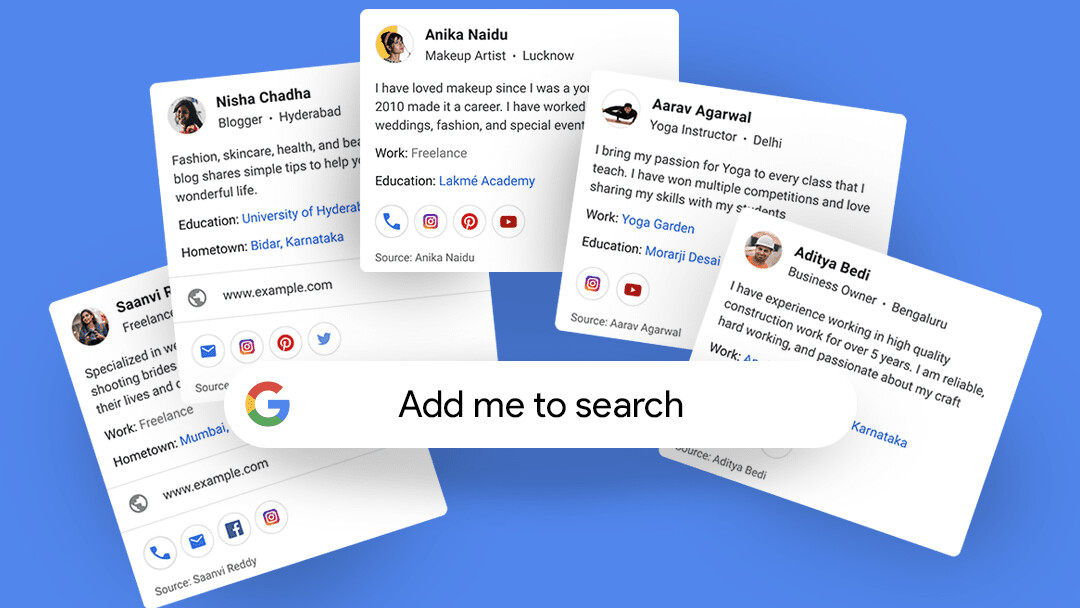
Google might be about to disrupt the business card — and it’s starting with a trial in India.
In a new blog post, the company announced it’s rolling out its ‘people cards’ across the country. It’s like a business card that will appear on top of Search when someone looks up your name. Google first began trialing the feature about six months ago, and it seems it’s finally ready to make it more widely available.
Up until now, you could only find detailed information about celebs and well-known public figures on Search, but the latest change will make it possible for civilians to control what people see when someone searches their name.
“If you’re a business professional, performer, or anyone looking to build up your own online presence, you might have a website, social profiles, and other information spread across many sites,” Google product manager Lauren Clark said. “If you’re just getting started, you may not have a website or much of an online presence at all.”
“Today, we are solving these challenges with a new feature called people cards,” she added. “It’s like a virtual visiting card, where you can highlight your existing website or social profiles you want people to visit, plus other information about yourself that you want others to know.”
(A visiting card is virtually the same as a business card, FYI.)
Here’s what this looks like:
To create a ‘people card,’ you need to simply log into your Google account, search for your name or “add me to Search,” and then follow the prompt. You can then choose a profile pic (it will default to your Google account avatar), craft a description for yourself, and also add social media links and contact details.
In case you were worried about your privacy, the feature seems to be opt-in — and you can always delete your card if you so wish.
Google will allow only one card per account to prevent malicious actors from impersonating real people. It’ll also ask you to authenticate your account with a phone number. In case fraudulent cards slip through the cracks, there’ll also be a dedicated button to report them.
Alright, but what about people who share the same name, you might wonder. Well, Google says there will be a module that lets you compare people based on their location and profession, which should make it easier to find the right person.
Look, as much as the skeptic in me is concerned about Google building a rolodex of the entire world, I’m weirdly enthusiastic about the prospect of disrupting the business card. The feature is currently exclusively available in India, but we might see it pop up in more places if the trials turn out to be successful.
I don’t expect to stop seeing pinboards in literally every tech hub you set foot in anytime soon, but the business card has felt like a thing of the past for a while. It’s just not that convenient to use: you always have to carry one, you can only order by the bulk, there’s no way to edit it if anything changes, they’re painfully easy to lose, and even more annoying to find.
Companies have been trying to bring the business card to the digital age for years, but convincing people to drop the paper has proved to be a tall order. It seems the promise of convenience isn’t enough to lose an old habit — but Google might just be influential enough to make that happen.
Google doesn’t have the trend-setting reputation of Apple, but it’s powerful enough to impact our use of technology on a cultural level. It’s also got the popularity of Search on its side.
Being easily discoverable on Search is a valuable asset these days — and entrepreneurs and freelancers know that. At the same time, it’s also a great way for Google to provide more value for its users on an individual level.
Sure, LinkedIn has already built an entire social network around the idea of building up professional contacts, but what makes ‘people cards’ appealing is that it doesn’t replace what LinkedIn does — it’s a thing of its own.
It not only solves all of the content shortcomings of the business card, but also makes it easy to add more personality with a custom description. It doesn’t hurt that it makes it easy to share your social media profiles either. It’s like an About Me page within Search, but without the hassle of building a personal site.
That said, there are certain challenges ahead of it. The fact that Google highlighted the numerous measures it has taken to prevent abuse makes it abundantly clear that the company foresees certain issues with the new feature. If it manages to stop users from gaming the system to gain an unfair advantage, ‘people cards’ can kill the business card as we know it.
Get the TNW newsletter
Get the most important tech news in your inbox each week.




